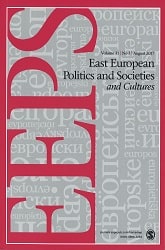Aspiring, Ambivalent, Assertive: Bulgarian Middle-Class Subjectivities and Boundary Work through Migration
Aspiring, Ambivalent, Assertive: Bulgarian Middle-Class Subjectivities and Boundary Work through Migration
Author(s): Polina ManolovaSubject(s): Social development, Family and social welfare, Economic development, Migration Studies, Socio-Economic Research
Published by: SAGE Publications Ltd
Keywords: postsocialism; migration; “the West”; middle-class subjectivities; boundary work;
Summary/Abstract: This article investigates the subjectivities of a group of aspiring middle-class Bulgarians and their boundary work in the context of their migrations to the United Kingdom. Drawing on Lamont’s critique of Bourdieu’s theory on class formation and reproduction, it shows how people from underprivileged social backgrounds can lay claims to middleclassness by strategically drawing on cultural and moral markers of distinction revolving around the notions of “civilization,” “culturedness,” and the “West.” The adoption of such narratives and their enactment in the cultivation of personal attributes, however, fails to guarantee full-fledged middle-class membership for people who lack the necessary economic and social capital. Thus, boundary building becomes the key mechanism for negotiating ambivalent middle-class subjectivities and rejecting objectively assigned positions in the social structure. The article traces the emergence of ideal-type models of middle-class belonging since 1989, their adoption by aspirational middle-class people, and the boundary work and self-differentiation by which they try to reassert their superior status both before during and after their migrations to the UK. It concludes that the observed everyday processes of group classification through the defining of and distancing from cultural, moral, and racial “others” reproduces class antagonisms that preclude a more critical understanding of the discontents of Bulgaria’s capitalist transition.
Journal: East European Politics and Societies
- Issue Year: 34/2020
- Issue No: 02
- Page Range: 505-528
- Page Count: 24
- Language: English
- Content File-PDF

